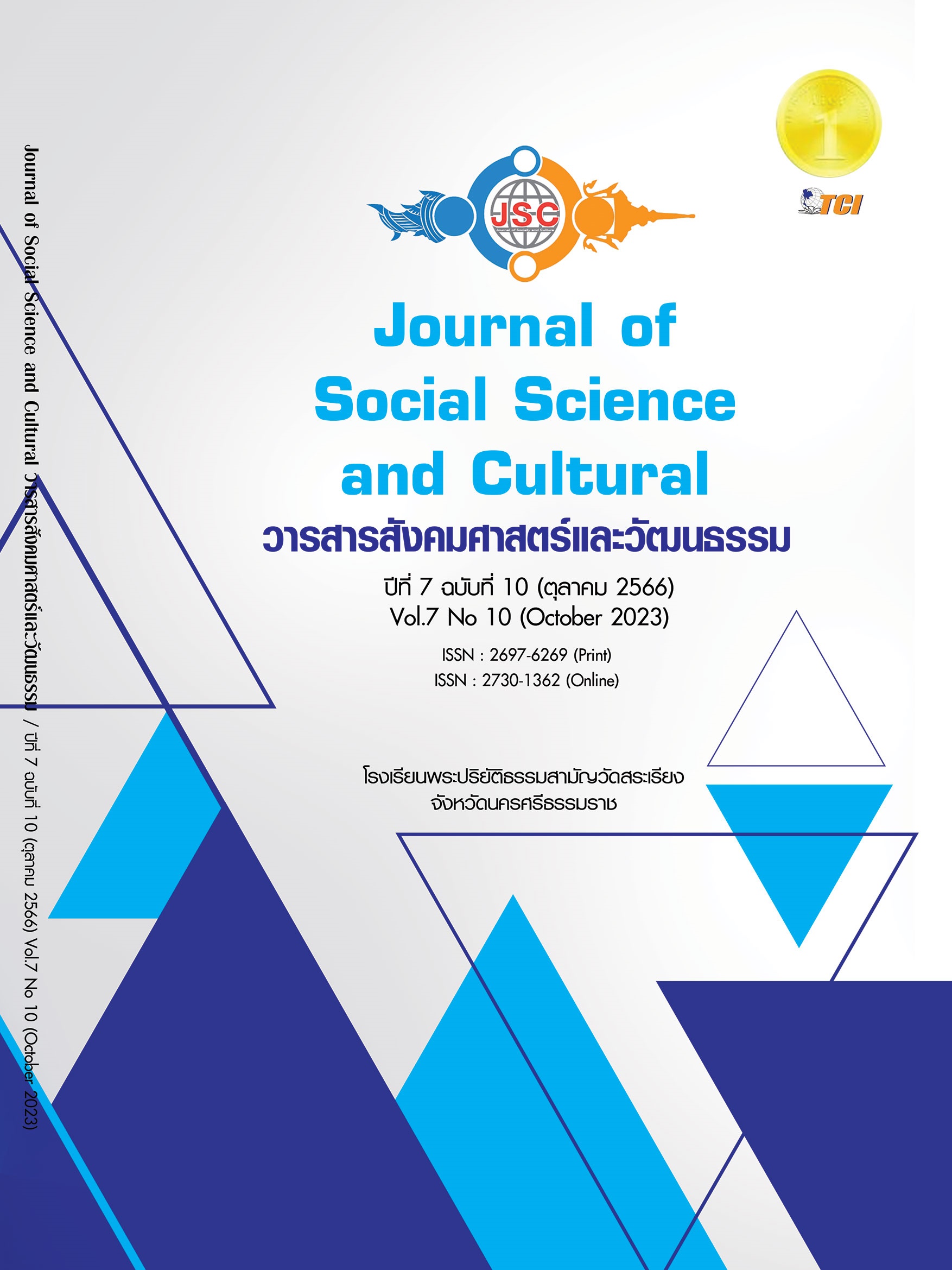DEVELOPING A COLLABORATIVE LEARNING COMMUNITY SYSTEM TO ENHANCE DIGITAL CHARACTERISTICS HIGH SCHOOL STUDENTS
Main Article Content
Abstract
The purposes of this research were 1) to study Digital Characteristics Students 2) to develop a Collaborative Learning Community System to Enhance Digital Characteristics High School Students, and 3) to evaluate the effectiveness of using a Collaborative Learning Community System to Enhance Digital Characteristics. The research has 3 phases as follows: Phase 1. Studying Digital Characteristics Students. Phase 2. Developing a Collaborative Learning Community System to enhance Digital Characteristics High School Students and Phase 3. Evaluating the effectiveness of using a Collaborative Learning Community System to enhance Digital Characteristics. The Results were: 1)Digital Characteristics Students consists of 7 Components 1.1) Digital Access 1.2) Digital Ethic 1.3) Digital Communication 1.4) Digital Critical 1.5) Digital Analysis 1.6) Digital Self-development and 1.7) Digital Recognize 2) developing the Collaborative Learning Community System to Enhance Digital Characteristics High School Students consists of 7 Components 2.1) Principle of system 2.2) Objectives 2.3) Input 2.4) Process 2.5) Output 2.6) Feedback 2.7) Evaluation. 3) The effectiveness of the Collaborative Learning Community System to Enhance Digital Characteristics High School Students. The posttest average of students who uses a Collaborative Learning Community System to Enhance Digital Characteristics High School Students was posttest higher than pretest by statistically significant at the 0.05 level and the students’ satisfaction was 4.50 level.
Article Details
References
กรมกิจการเด็ก และเยาวชน. (2561). ร่างแผนพัฒนาเด็กและเยาวชนแห่งชาติ พ.ศ. 2560 - 2564. เรียกใช้เมื่อ 25 ตุลาคม 2563 จาก http://dcy.go.th/webnew/main/news_view.php?id=1492&type=12
เฉลิมพล แจ่มจันทร์ และคณะ. (2563). วัยรุ่นและเยาวชน กับสื่อสังคมออนไลน์. เรียกใช้เมื่อ 24 ตุลาคม 2562 จาก https://www.thaihealthreport.com/th/articles_detail.php?id=64
ทรูปลูกปัญญา. (2562). ทำไมเยาวชนไทย ต้องใส่ใจเรื่อง Digital Footprint. เรียกใช้เมื่อ 24 ตุลาคม 2562 จาก https://www.trueplookpanya.com/education/content/76135-teaartedu-teaart- 24
ปราณี ทองคำ. (2539). เครื่องมือวัดผลทางการศึกษา. ปัตตานี: มหาวิทยาลัยสงขลานครินทร์.
ภัทริกา วงศ์อนันต์นนท์. (2557). พฤติกรรมการใช้อินเทอร์เน็ต ของเด็กและเยาวชน Excessive Internet Usage Behavioral in Adolescents. วารสารพยาบาลทหารบก, 15(2), 173-178.
ล้วน สายยศ และอังคณา สายยศ. (2538). เทคนิคการวิจัยทางการศึกษา (พิมพ์ครั้งที่ 4). กรุงเทพมหานคร: สุวีริยาสาส์น.
วรรณากร พรประเสริฐ. (2562). ความเป็นพลเมืองดิจิทัลของนิสิตนักศึกษาระดับปริญญาตรี ในสถาบันอุดมศึกษาของรัฐ. วารสารศึกษาศาสตร์ มหาวิทยาลัยทักษิณ, 19(2), 104-117.
วิชัย วงษ์ใหญ่ และมารุต พัฒผล. (2557). การโค้ชเพื่อการรู้คิด. (พิมพ์ครั้งที่ 3). กรุงเทพมหานคร: จรัลสนิทวงศ์การพิมพ์.
สรัญญา จันทร์ชูสกุล และคณะ. (2560). การพัฒนามาตรวัดการรู้เท่าทันสื่อและสารสนเทศสำหรับนักเรียนระดับชั้นมัธยมศึกษา. วารสารการวัดผลการศึกษา มหาวิทยาลัยมหาสารคาม, 23(2), 183-196.
สำนักงานคณะกรรมการการศึกษาขั้นพื้นฐาน. (2563). ประกาศสำนักงานคณะกรรมการการศึกษาขั้นพื้นฐาน เรื่อง นโยบายสำนักงานคณะกรรมการการศึกษาขั้นพื้นฐาน ปีงบประมาณ พ.ศ. 2564 - 2565. เรียกใช้เมื่อ 21 กรกฎาคม 2565 จาก https://obeclaw.obec.go.th/archives/1118
สำนักงานเลขาธิการสภาการศึกษา. (2560). แผนการศึกษาชาติ พ.ศ. 2560 - 2579. กรุงเทพมหานคร: สำนักพิมพ์พริกหวานกราฟิกจำกัด.
สิทธิชัย ลายเสมา. (2557). ระบบการเรียนรู้ร่วมกันด้วยทีมเสมือนจริงในสภาพแวดล้อมการเรียนแบบภควันตภาพโดยใช้กระบวนการแก้ปัญหาเชิงสร้างสรรค์เพื่อพัฒนาความคิดสร้างสรรค์และทักษะการทำงานร่วมกัน. กรุงเทพมหานคร: มหาวิทยาลัยเทคโนโลยีพระจอมเกล้าพระนครเหนือ กรุงเทพมหานคร.
สุวิมล ว่องวาณิช และนงลักษณ์ วิรัชชัย. (2546). แนวทางการให้คำปรึกษาวิทยานิพนธ์. กรุงเทพมหานคร: ศูนย์ตำราและเอกสารทางวิชาการ คณะครุศาสตร์ จุฬาลงกรณ์มหาวิทยาลัย.
อุทุมพร จามรมาน. (2531). การสังเคราะห์งานวิจัย: เชิงปริมาณเน้นวิชาวิเคราะห์เมตต้า. กรุงเทพมหานคร: พันนีพับลิสชิ่ง.
Guskey,T. R. (2000). Evaluation professional development. California: A sage.
Turney, B.L. & Robb, G. P. (1971). Research in Education : An Introduction. Illinois: The Dryden Press, Inc.


